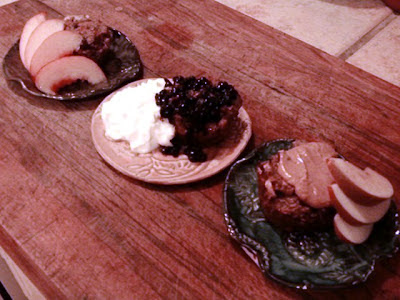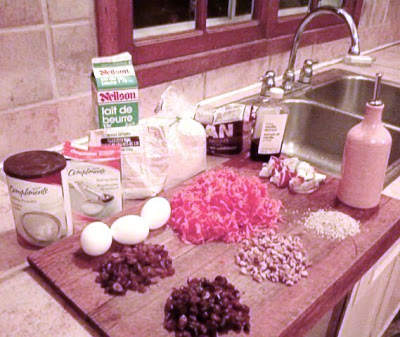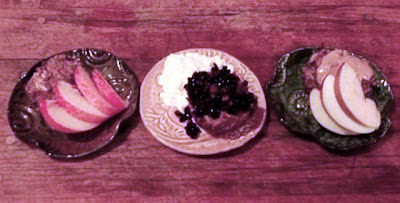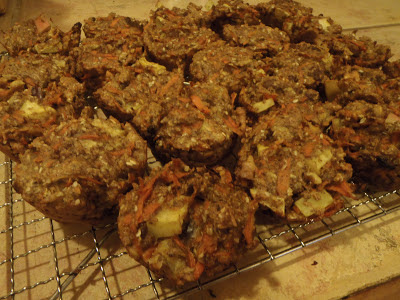 |
| The obligatory pretentious presentation shot. |
Muffins are a food group. I’m not talking about those greasy, supersized store-bought muffins—those are cake in disguise. For example, the healthy sounding Tim Horton’s Raisin Bran muffin packs a whopping 410 Cal, 490 mg of sodium and 40 g of sugar, more than any of the donuts. Now there’s nothing wrong with cake, but let’s call a spade a spade. No, I’m talking about wholesome homemade muffins with quality ingredients. Think of them not as cake but as bread’s nuttier, seedier, fruitier and more exciting cousin.
I’m an addict. I eat a few every day: breakfast, pre/mid/post-workout, desk snacking… Muffins are a great “real food” alternative to energy bars. I make different kinds, but I always return to one recipe. It has been refined over zillions of batches, with no two batches exactly the same. Here’s the latest iteration:
- 1½ c. whole wheat flour (or some blend of quinoa, chickpea or buckwheat flour)
- ½ c. flax seed meal
- ½ c. oat/wheat bran or large flake oats
- ⅓ c. shredded coconut (I use unsweetened.)
- 2 tsp. baking powder
- 1 tsp. baking soda
- 2 tsp. cinnamon
- 1 tsp. nutmeg
- 3 eggs
- 1 c. buttermilk/milk
- ¼ c. oil (vegetable, sunflower, coconut, light olive…)
- 2 tsp. vanilla extract
- zest of 1 orange (or sub ⅓ c. orange juice for buttermilk/milk)
- 3 c. grated carrot (or zucchini or a blend)
- 1 apple chopped into small pieces (I leave the skin on.)
- ½ c. chopped walnuts
- ⅓ c. sunflower/pumpkin/hemp seeds
- 1 c. chopped dates/raisins/cranberries/currants/apricots (some blend)
- ½ c. crushed pineapple (optional: sub for ½ c. carrot)
- sweetener (optional, to taste: brown sugar, honey, malt syrup…)
 |
| Everything including the kitchen sink. |
- Mix dry ingredients.
- In a separate bowl, whisk together eggs, buttermilk/milk, oil, vanilla, sweetener and orange juice/zest.
- Preheat the oven to 350°F (180°C). This doesn’t take half an hour—that just wastes energy.
- Add wet ingredients to dry ingredients and stir just enough to blend.
- Mix in grated carrot, pineapple, apple pieces, dried fruit, walnuts and seeds.
- Adjust the consistency of the batter as needed by adding liquid. It shouldn’t be clumpy or runny.
- Fill muffin pans. The recipe makes about two dozen small muffins or fewer larger muffins.
- Bake 16-18 minutes at 350°F (180°C).
- Muffins keep for ~3 days and freeze well.
Almost every ingredient is optional, so don’t sweat it if you don’t have something. Here’s a shocking revelation: you don’t have to follow recipes to a tee—it’s ok to experiment. Martha Stewart won’t swoop down in a black helicopter and confiscate your apron. It’s nearly impossible to bake something inedible, especially if you’re a ravenous athlete.
OMG, WHEAT! Wheat is the root of all evil! Sorry anti-gluten crusaders and paleo zealots. I’ve experimented with flourless baking and wheat alternatives with mixed results. The Western diet is too wheat-heavy, no argument there. But wheat flour is tasty, cheap, commonly available and healthy in moderation.
 |
| Muffins are complemented by a dollop of cottage cheese and a healthy slathering of PB (as are most foods). |
This is the first post in a series, Endurance Eats, where I share healthy vegetarian recipes for hard-training athletes.
Disclaimer: This is not a food blog and I certainly don’t pretend to be a foodie. There’s no shortage of those on the internet. But too many alienate the culinarily-challenged masses with intimidating cooking techniques and exotic ingredients (e.g. guava nectar, acai berries, chia butter, eye of newt etc.). I’ll avoid yuppie “superfoods” and stick with no-nonsense stuff that you can find at the grocery store or local farmers’ market. Because you shouldn’t have to arrange financing at an organic health food boutique or give your first born at a holistic medicine emporium.










